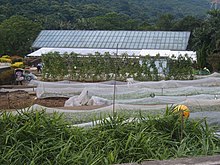Lawrence Kadoorie, Baron Kadoorie
Lawrence Kadoorie, Baron Kadoorie , CBE (born June 2, 1899 in Hong Kong , † August 25, 1993 ibid) was an entrepreneur , hotelier and philanthropist . The billionaire was the first member of the House of Lords to come from Hong Kong.
Family background
Lawrence Kadoorie came from a respected Tai-Pan family; his father was Sir Elly Kadoorie and his uncle Sir Ellis Kadoorie . His ancestors were Mizrahi -Juden of Baghdad , the mid-18th century to Bombay had emigrated. His father came to Hong Kong in 1880, a poor man , and began working for the Sassoon family . Kadoorie built up his own company empire in Shanghai , Guangzhou (Canton) and Hong Kong, especially in the energy and construction sectors as well as in the hotel industry. Elly Kadoorie was knighted by the King of England for his entrepreneurial achievements. During the Japanese occupation, his Peninsula Hotel was confiscated by the Japanese and used as their headquarters. Elly Kandoorie himself died in Shanghai at Stanley Camp , while his son survived the war in another camp and was later under house arrest at the Marble Hall family home in Shanghai.
resume
Elly Kandoorie's two sons, Lawrence and his brother Horace, claimed the hotel back after the war ended, but their most important property, the China Light and Power , was in ruins. Four years later, all of the family's properties in China were confiscated by the People's Liberation Army , including the family seat on Bubbling Well Road in Shanghai. The brothers moved to Hong Kong and decided to rebuild the plant that provided power to Kowloon and the New Territories . Historians consider this decision to be essential to Hong Kong's post-war economic recovery. Lawrence Kandoori became one of the richest men in Hong Kong.
Kandoori and his brother ran their businesses in a patriarchal way , with genuine concern for their employees. In its obituary, The Independent wrote that the Kadoorie's fortunes could have been even greater - estimated at $ 3 billion at the time of Lawrence Kandoori's death - if their low-wage workers had been taken advantage of, as many of their contemporaries did. The brothers also got involved in numerous charitable projects.
Lawrence Kandoori firmly believed that economic cooperation between Hong Kong and China would make sense. He pointed out that the leadership in China was largely guided by practical considerations and did not share the Hong Kong business community's fears that Hong Kong would lose its economic importance after being returned to China in 1997.
He was a member of Hong Kong's Executive Council from 1951 to 1954 , was knighted in 1974 and made a life peer as Baron Kadoorie, of Kowloon and of the City of Westminster in 1981 in recognition of his charitable work. He was honored with the Ramon Magsaysay Award , an award for achievements in Asia, named after the former Philippine President. He received the Belgian Ordre de la Couronne and was accepted into the French Legion of Honor .
Among the projects that Kandoori initiated and supported financially is the Kadoorie Agricultural Aid Association , whose task it was initially to provide refugees from China with a livelihood as farmers, which is now run as the Kadoorie Farm and Botanic Garden .
Kandoori died in 1993 at the age of 94 and is buried in the Jewish Cemetery in Happy Valley, Hong Kong . His wife survived him by 18 years and died in 2003 at the age of 96. His son is Michael Kadoorie .
Individual evidence
- ↑ a b c d e Obituary for Lord Kadoorie on independent.co.uk v. August 26, 1993
- ^ A b Matthias Messmer: China. Locations of west-east encounters . Böhlau 2007. p. 195
- ↑ a b Lawrence Kadoori on rmaf.org.ph
- ^ Matthias Messmer: China. Locations of west-east encounters . Böhlau 2007. p. 196
- ↑ Lawrence Kadoorie, 94, Is Dead; A Leader in Hong Kong'g Growth - New York Times . In: The New York Times . August 26, 1993. Retrieved February 3, 2011.
- ↑ scmp.com
Web links
- Obituary Lord Kadoorie on independent.co.uk v. August 26, 1993
- Amelia Allsop: "The Lost Records Revealed Hong Kong Heritage Project's Jewish collection" on asianjewishlife.org
| personal data | |
|---|---|
| SURNAME | Kadoori, Lawrence, Baron Kadoori |
| BRIEF DESCRIPTION | Chinese entrepreneur, hotelier and philanthropist (Hong Kong) |
| DATE OF BIRTH | June 2, 1899 |
| PLACE OF BIRTH | Hong Kong |
| DATE OF DEATH | August 25, 1993 |
| Place of death | Hong Kong |
